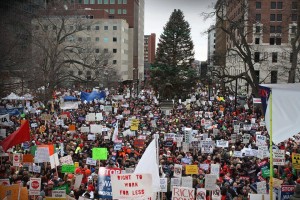
By MARK GRUENBERG
PAI Staff Writer
Lansing, Mich. (PAI)—Brushing aside massive protests by Michigan union workers and a denunciation from Democratic President Barack Obama, the GOP-run Michigan legislature steamrolled through a pair of so-called “right to work” laws on Dec. 11. GOP Gov. Rick Snyder promptly signed them.
Union members and other workers, who jammed the state capitol building in Lansing, packed the galleries and took over the lawn, responded with horns, jeers, chants of “Kill the bill!” and promises to get even at the polls.
Speakers called the new law a divide and conquer strategy to roll back workers’ rights and weaken the ability of unions to compete with business in political campaigns and state and federal public policy affecting the workplace.
They pointed out that states with RTW (for less) laws have higher poverty rates, more accidents in the workplace and lower wages for all workers. These bills have no correlation with job creation and are nothing but a corporate backed attempt to keep wages low, they said.
In media interviews after he signed the bills, Snyder refers to them as “pro-worker.”
But “right-to-work” (for less) legislation in states that have adopted the laws paints a different picture.
According to the Economic Policy Institute, right-to-work( for less) laws have virtually no impact on job growth and have a negative impact on both union and nonunion workers, reducing wages by up to $1,500 a year. A Ball State University study conducted during Indiana’s push to pass right-to-work (for less) found that “no impact is likely” for job growth or wages in the manufacturing sector. Another EPI study suggests that right-to-work laws had a negative impact on Oklahoma’s economy and that right-to-work is “is ineffective as a strategy for increasing a state’s employment.”
The right-to-work experiment failed miserably the last time it was tried in the Midwest. Indiana originally passed right-to-work laws in 1957, but workers hated the new laws so much that they were repealed just eight years later.
“Listen to the people!” Teamsters President James Hoffa shouted at the packed outdoor rally on Dec. 11. “Let the people decide!”
In broadcast interviews with CNN and Thom Hartmann, the liberal commentator on Serius XM satellite radio, Hoffa compared the situation to Pearl Harbor and “a new civil war.”
Estimates were that about 15,000 union members and pro-union allies showed up in Lansing.
Since right-to-work’s approval on party lines was a foregone conclusion, Hoffa promised that unionists in Michigan would circulate petitions to get a vote repealing it onto the next election’s ballot in 2014 – when Snyder will be up, too.
The lame-duck session of the legislature approved two right-to-work laws, one covering almost all public workers and the other covering all private sector workers. Both ban unions from negotiating clauses in contracts with employers to provide dues collection to pay for union services, such as bargaining and grievances.
RTW WEAKENS UNIONS
The practical effect, union leaders say, is to weaken unions financially over time as many workers choose not to pay their dues voluntarily.
That reduces their power to bargain for decent wages and benefits and to pay for member education and advocacy during political campaigns and with state and federal lawmakers.
Obama, speaking at an auto parts plant in Detroit the day before the law was passed, said, “What we shouldn’t do — I just got to say this — what we shouldn’t be doing is trying to take away your rights to bargain for better wages and working conditions. “We shouldn’t be doing that. These so-called ‘right to work’ laws, they don’t have to do with economics. They have everything to do with politics. What they’re really talking about is giving you the right to work for less money,” Obama added, to a loud cheer from union workers at the auto plant.
“You only have to look to Michigan — where workers were instrumental in reviving the auto industry — to see how unions have helped build not just a stronger middle class but a stronger America.
…We don’t want a race to the bottom. We want a race to the top,” he added.
OTHER UNION LEADERS
Besides the Teamsters — whose president, Hoffa, is a Michigan native — and the Detroit-based United Auto Workers, unionists, activists and leaders from all over the country descended on Lansing to demonstrate against the right-to-work laws.
Steelworkers President Leo Gerard said, “If the governor feels this bill will move Michigan forward, he should delay the final votes and allow an amendment to put this issue before the public as a state ballot initiative.
“We urge Snyder to delay signing the bill. Let the people of Michigan debate and vote on a consequential matter that will affect all working families.”
“We know the newly-elected Michigan state legislature convening early next year has added Democrats that would reject a right-to-work-for-less bill,” Gerard said. “Right-to-work is only supported by millionaires and billionaires who profit by taking more money out of the workers’ pockets.”
Particularly noticeable was a delegation from Wisconsin, scene of another big workers-vs.-GOP fight the last two years, over Radical Right GOP Gov. Scott Walker’s law ending collective bargaining rights for 200,000 state and local government workers.
The Wisconsin workers’ bus was plastered with their famous big blue raised fist poster, in the shape of Wisconsin, and its familiar “We Are Wisconsin!” slogan – except the word “Wisconsin” was superimposed by a sticker labeled “Michigan”.
“Right to work for less is an assault on democracy and on workers’ rights – and is serious as the assaults in Wisconsin and Ohio,” said AFSCME President Lee Saunders. He asked members nationwide to call or e-mail lawmakers and Snyder.
“We didn’t begin this war, we didn’t start this fight, but we’re sure as hell going to finish it,” Teamsters Local 299 member Patty McGuckin of Detroit told the crowd.

